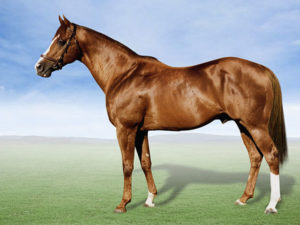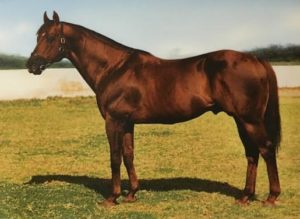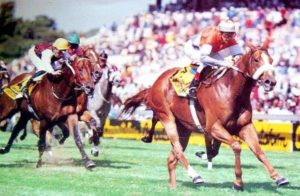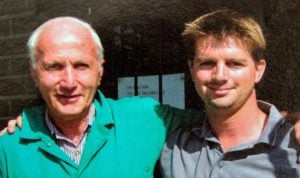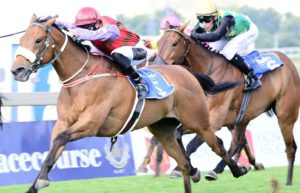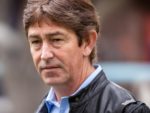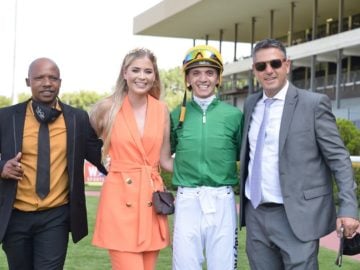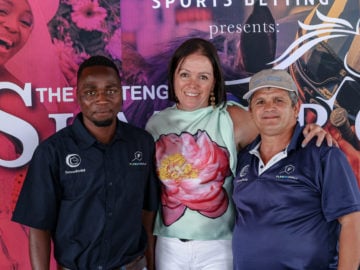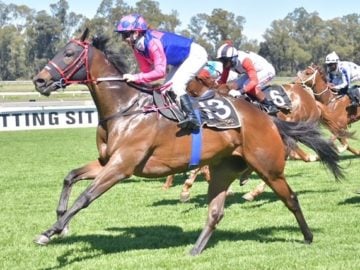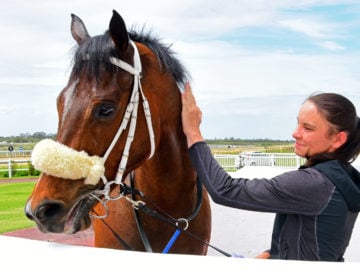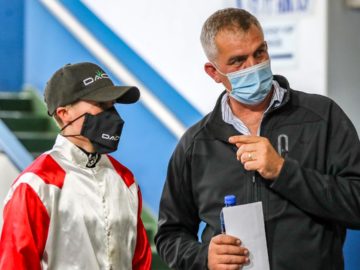Ceres based Boland Stud has been in eye-catching form of late. With a pair of Var daughters (Cup Cake and Varlicious) taking the honours at Fairview on 19 February and Captain Aldo reeling off back to back wins in the Listed Wolf Power 1600 and Gr2 Hawaii Stakes, plus a number of Boland graduates making their presence felt on tracks around the country, we caught up with Eugene Freeman.
The fresh-faced, ever smiling Eugene is a regular fixture at sales, most often found with his neighbour and friend, Vaughan Koster. Eugene may be the public face of the stud, but the farm has a long history, starting with his grandfather, Charles Freeman.
Stud history
Charles Freeman (father to the affable – it seems to run in the family – Dr Frank Freeman), was a chartered accountant and settled in Ceres after being appointed to doing the accounts for the Deciduous Fruit Board. The Boland breeding operation originally started at Daytona, where Charles farmed with fruit and sheep in partnership with his brother in law, Senator Paul van Zyl.
When Frank Freeman qualified as a vet in 1963, he returned to Ceres to assist with the farm and established Ceres Veterinary Hospital. There was only one stud in the district at the time and that was Odessa. Dr Freeman says “most of what I’ve learnt about horses, I owe to Colin Cohen. He allowed me to learn and make mistakes. He was very kind to me”. It was Colin who originally suggested starting a boarding stud at Daytona. The deal was that Charles would continue to run the fruit and sheep while Frank would run the stud, as long as the horses remained self-funding.
Important friendship
Celebrated breeding authority Sir Mordaunt Milner got them off the ground. Milner had kept his breeding stock with George Kramer at Broadlands, but when that farm was sold to the O’Neils, they didn’t want boarding mares and he needed to find alternate accommodation and so became Daytona’s first client. Charles and Milner became great friends. Originally introducing himself to the Freemans as a racing reporter, one of Milner’s uncles died and left him a title and he became Sir Milner. On the death of another uncle, he inherited a substantial amount of money and so he ended up with a title as well as means and proved a great asset to the farm, introducing a great many new clients, such as Major Wyatt, whose Force Ten was born at Daytona. Milner was writing the turf guide at the time and gave them lots of publicity.
Not only did Milner help expand their client base, but proved instrumental in the acquisition of Mexico II. Milner was at the York Club and ran into Peter Butler (Mexico II’s owner). At the time, Mexico II was based at Godrey Gird’s Wittehart Stud, but Godfrey felt the stallion was too small and had asked for him to be moved on. When Butler asked Sir Milner for advice, he suggested moving the horse to Daytona adding that Butler would be wise to sell a half share in the stallion to the stud as they would then be incentivised to support him. His comment, “Rather own half of a successful stallion than the whole of an average one’ sealed the deal and Harry Hotspur was one of his first progeny to be born at Daytona.
Frank relays the story of Harry Hotspur with relish. Mrs Barnett stood 2 mares at Daytona – Saturna and Royal Folly. When Major Barnett died, Mrs Barnett sought advice on how to breed the mares and was naturally recommended Mexico II. “For R250 she got Harry Hotspur and Maximillian!”
Harry Hotspur
When Harry Hotspur was a yearling, Gary Player happened to visit the farm. He was very taken with Harry Hotspur and enquired what Mrs Barnett might accept for him. After agreeing a price, Player flew trainer Bertie Sage down to look the colt over and he reported “quite correctly” adds Freeman, that he didn’t have the greatest of front legs and would be likely to have trouble with them (which he did). With a less than glowing report from the trainer, Player made a lesser offer, and Mrs Barnett decided to keep the horse and he ended up being trained by Colin Palm.
Credit also goes to Paddy Duncan (owner of Duncan Motor Spares and whose son Alfred Duncan still has racehorses) who found foundation mare Confident. “Paddy was a true Irishman,” remembers Frank. “Taught me a lot about horses. Confident was on a Birch Bros sale as being in foal. Paddy got a colt and showed him to the mare and she showed that she was in season, so he proclaimed loudly that she wasn’t in foal and got her cheap,” he chuckles. Freeman later bought the mare from Duncan and she would go on to produce Mexican Charm (the dam of sprint champion Senor Santa) as well as the granddam of Cape Guineas winner, Flight Alert.
New beginnings
In around 1974, the expanding breeding operation hit a stumbling block when Charles died and Daytona was sold to dissolve the partnership between his father and his uncle and the farm changed hands to Artur Pfaff. Freeman moved to the nearby Hamlet, before purchasing Boland Stud in December 1975 and building it up to what it is today. The story has a fun twist as Dr Freeman and his wife Tanya now live in Ceres and run a B&B called Chantilly, purchased from the Pfaff estate and named in memory of the region of France where they once paid the Pfaff’s a visit.
Pfaff had his own stallions and wasn’t interested in Mexico II, so he was moved to Varsfontein Stud. Dr Freeman remembers that Mexico II had a fantastic temperament. “You could use him as a teaser. We put up teasing rails at the side of the camps, put a rider on him and rode him from camp to camp. They did the same at Varsfontein – that’s how we kept him fit!”
The list of track stars bred by the Freemans and loyal patrons includes Harry Hotspur, Kiss of Peace, Foreign Agent, Welcome Boy, Rotterdam, Ovarowned, Corning Touch, Peri-Peri, Craftsman and the unforgettable Senor Santa, arguably one of SA greatest sprinters.
Senor Santa
There is a wonderful tale about the sale of Senor Santa. Micky Goss was selling a lot of high priced Northern Guests that year and after positive comments from Neil Orford opining that Senor Santa was the best Northern Guest on the sale, Freeman had high hopes. Senor Santa was led through the sales ring with a reserve of R80k, but went unsold. Tony Rivalland came running up afterwards and made an offer and that, reminisces Frank, was that. “But you seldom make the money on your champion.” However, his reward came a few years later when Senor Santa was at the height of his powers, and Boland consigned a half sister by Argosy for R350k.
Senor Santa was first trained by Tony Rivalland, before passing into the care of Willie Pieters. He raced in the interests of Messrs F.P. and H.J. Cawdry,winning 15 races from 1000 – 1600m, including 7 at Gr1 level. He was named 1987 ARCSA Champion 2yo Colt as well as Champion Sprinter for 1989 and 1990. Senor Santa enjoyed a long and happy retirement at Summerhill Stud, eventually passing on in 2014 at the ripe old age of 29. He is celebrated every year with the Gr2 Senor Santa Stakes, which will be run at Turffontein on 26 March 2016.
Generation next
Eugene Freeman was born and raised on Boland Stud, following his dad around the farm from an early age. For him the bug bit early with Senor Santa. “He was the first horse that got me passionate about racing. I was probably about 9 years old when he was Champion Sprinter. I had no idea of the commercial aspects of his success, but I’ll never forget sitting on the coffee table in front of the TV, watching his races with my family. The excitement this horse created was infectious – it got hold of everybody. I still get goosebumps and tears in my eyes. My father and I used to visit Summerhill every year after the Durban Sale and go and say hello to him. Those were special trips – not just seeing the horse, but also the time with my dad. There was a real family and emotional connection with him and he was always a really nice horse. Right from the time he was a foal – when my father went to check on the yearlings at night, the others would get up or run away, Senor Santa would just look up and go back to sleep. All Mexican Charm’s later foals were like that – very bold, friendly horses. I guess it was a love affair with that family.’
“When I finished school, my mother said ‘farming is the last thing you do until you’ve got a degree’, so I studied BCom Management Accounting at Stellenbosch. After that, my mother figured maybe I won’t come back and farm!’ I went to England and worked at Weatherbys for 6 months. It wasn’t really my scene – I’m not an indoors kind of person and hated coming into the office in the dark and leaving in the dark, but I learnt a lot. After that, I went to work at Juddmonte in Kentucky and that was amazing,” he enthuses. “Being out with the horses, working with the mares and foaling down, that’s what I love doing.” He also spent time at Mill Ridge under John Chandler, who was a family friend. “It’s a beautiful farm and I got to see horses like Gone West and Toussaud (Empire Maker’s dam). From there I was going to take a gap year, but my mother said it was time to come home and do some work for a change!’ he laughs good-naturedly.
Eugene came back to South Africa in 2005 and took up the reins at Boland, which he now runs alongside his wife, Hannelu. She is a qualified vet who holds an honours degree in equine reproduction and has joined Dr Freeman’s practice in Ceres. They get sent mares with reproductive problems from all over the country and Eugene says his wife and father love the challenge.
“It was just before the markets crashed in 2008 and I remember my first year at the sales thinking ‘this is so easy, I don’t know what my parents are complaining about!’ A year later I found out very quickly. Where it had been easy to get money for just about any horse, a year later you couldn’t give them away. Running a commercial operation teaches you very quickly not to breed with anything below standard – the market is not very forgiving. That was probably my biggest lesson, but my parents let me make the decisions and cry about my own mistakes.”
Eugene is focussed on building up the quality of his broodmare band before trying to increase the numbers and as their results reflect, the strategy is paying dividends. As quality fillies are hard to come by, he also breeds in partnership with clients, with Captain Aldo being the result of a partnership in Cuddle Me, owned by Aldo Girolo (who still owns a half share in the colt). With the Hawaii Stakes in the bag, he has stamped his credentials for the Horse Chestnut Stakes. Cuddle Me subsequently produced Cup Cake, who finished 3rd in last week’s Breeders Guineas.
Boland offer a quality draft for the 2016 National Yearling Sale, including a Var colt out of an own sister to Gr1 Premier’s Champion Stakes winner Talahatchie, a Judpot colt from the family of Olympic Duel and Dancing Duel and a Var colt from the family of Senor Santa and Cape Guineas hero Flight Alert.



